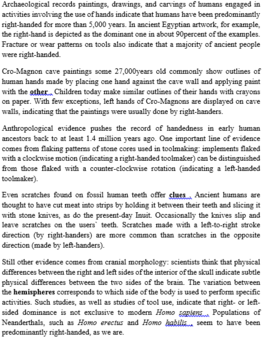Read the following passage and mark the letter A, B, C, or D on your answer sheet to indicate the correct answer to each of the following questions.
Fish that live on the sea bottom benefit by being flat and hugging the contours. There are two very different types of flatfish and they have evolved in very separate ways. The skates and rays, relatives of the sharks, have become flat in what might be called the obvious way. Their bodies have grown out sideways to form great “wings”. They look as though they have been flattened but have remained symmetrical and “the right way up”. Conversely, fish such as plaice, sole, and halibut have become flat in a different way. There are bony fish which have a marked tendency to be flattened in a vertical direction; they are much “taller” then they are wide. They use their whole, vertically flattened bodies as swimming surfaces, which undulate through the water as they move. Therefore, when their ancestors migrated to the seabed, they lay on one side than on their bellies. However, this raises the problem that one eye was always looking down into the sand and was effectively useless – In evolution this problem was solved by the lower eye “moving” around the other side. We see this process of moving around enacted in the development of every young bony flatfish. It starts life swimming near the surface, and is symmetrical and vertically flattened, but then the skull starts to grow in a strange asymmetrical twisted fashion, so that one eye, for instance the left, moves over the top of the head upwards, and old Picasso – like vision. Incidentally, some species of 20 flatfish settle on the right side, others on the left, and others on either side.
The word “this” refers to _______.
A. the migration of the ancestors
B. the practice of lying on one side
C. the problem of the one eye looking downwards
D. the difficulty of the only one eye being useful


Đáp án B.
Key words: this.
Clue: “…when their ancestors migrated to the seabed, they lay on one side than on their bellies. However, this raises the problem that one eye was always looking down into the sand and was effectively useless”: … khi tổ tiên của chúng di cư đến thềm lục địa đã nằm ngả về một phía thay vì nằm bằng bụng. Tuy nhiên, điều này làm dấy lên vấn đề khiến một mắt của chúng luôn nhìn xuống dưới cát và gần như là vô dụng.
“Điều này” ở đây là việc loài cá này nằm ngả về một bên.
A. the migration of the ancestors: Sự di cư của tổ tiên của chúng: Sai.
B. the practice of lying on one side: Việc tập nghiêng về một phía: Đúng.
C. the problem of the one eye looking downwards: Vấn đề mắt nhìn xuống dưới: Sai.
D. the difficulty of the only one eye being useful: Khó khăn trong việc chỉ có một mắt nhìn được: Sai.